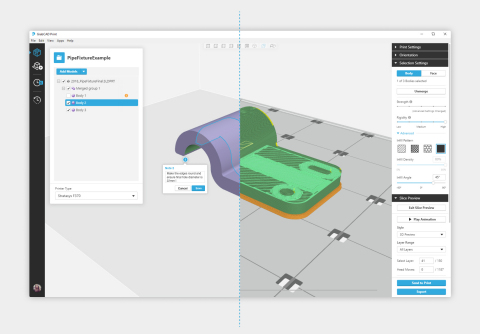Advanced FDM Software designed to eliminate CAD-to-STL roadblock, streamlining workflow, production times, material usage – aimed at speeding time-to-market and revenue
DALLAS — (BUSINESS WIRE) — February 11, 2019 — SOLIDWORKS WORLD – Empowering designers and engineers to embrace new 3D printed possibilities, Stratasys (NASDAQ: SSYS) is further removing complexity from design-to-3D print processes. GrabCAD Print’s Advanced FDM feature is aimed at ensuring design intent via intuitive model interaction to rapidly deliver strong, light, and purpose-built parts.
This press release features multimedia. View the full release here: https://www.businesswire.com/news/home/20190211005369/en/

GrabCAD Advanced FDM eliminates the CAD-to-STL conversion process - creating new possibilities for designers and engineers with 3D Printing. (Graphic: Business Wire)
By avoiding laborious CAD-to-STL conversion, users are able to work in high fidelity and rapidly advance the design-to-3D print process– which can lead to boosting both time-to-market and time-to-revenue. Advanced FDM is designed to speed part production, while maintaining creation of purpose-built parts that minimize weight without compromising strength.
“For design and manufacturing engineers, one of the most frustrating processes is ‘dumbing down’ a CAD file to STL format - only to require subsequent re-injection of design intent into the STL printing process,” said Mark Walker, Lead Software Product Manager at Stratasys. “This software is engineered to do away with this complexity, letting designers reduce iterations and design cycles – getting to a high-quality, realistic prototype and final part faster than ever before.”
With rich CAD-native build controls, the solution doesn’t require manual generation of complex toolpaths – cutting overall programming times for 3D printing. Intuitive features achieve desired part characteristics through automatic control of FDM build attributes. Engineers easily select areas on native design geometry and specify design attributes – letting Advanced FDM automatically calculate 3D print toolpaths.
“GrabCAD Print Advanced FDM’s geometry-based workflows have allowed us to fine-tune part builds – meeting application requirements and process parts more quickly than we could before,” said Robert Heath, Additive Manufacturing Application Engineer at Eckhart. “The seamless transition of moving a build between applications is easy and intuitive.”
Assigning attributes directly to CAD models, users pinpoint areas of strength and rigidity, control infills, ensure sufficient material around holes with inserts, and avoid seams. Since toolpaths are automatically generated from model assignments, the user can expect to spend significantly less time on part setup, without losing strong, high-quality, purpose-built FDM parts.
“Advanced FDM has proved invaluable in improving our part processing time. When processing a very large number of tools and fixtures in a very time pressured environment, it was crucial to ensure stronger tool areas were correct first time, every time,” said Dave Hewitson, Rapid Prototyping Programmer at McLaren. “Advanced FDM negates the requirement for multiple programs - creating a more streamlined process. It’s also allowed us to more effectively control the structure of end-use car parts, something that was previously very difficult with the solutions we had in hand. This means we can get better parts to the track faster.”
GrabCAD’s Advanced FDM is available now via download with GrabCAD Print (from versions 1.24) and is supported on the following Stratasys 3D printing systems: F370, Fortus 380mc, Fortus 380mc Carbon Fiber Edition, Fortus 450mc, Fortus 400mc, Fortus 900mc, and F900.
Learn more about the power of GrabCAD and Advanced FDM and the power of Stratasys by visiting: https://grabcad.com/print/features or https://www.stratasys.com/software
Stratasys is a global leader in additive manufacturing or 3D printing technology and is the manufacturer of FDM® and PolyJet™ 3D Printers. The company’s technologies are used to create prototypes, manufacturing tools, and production parts for industries, including aerospace, automotive, healthcare, consumer products and education. For 30 years, Stratasys products have helped manufacturers reduce product-development time, cost, and time-to-market, as well as reduce or eliminate tooling costs and improve product quality. The Stratasys 3D printing ecosystem of solutions and expertise includes: 3D printers, materials, software, expert services, and on-demand parts production. Online at: www.stratasys.com, http://blog.stratasys.com and LinkedIn.
GrabCAD and Stratasys are registered trademarks and GrabCAD Print, F370, Fortus 380mc, Fortus 450mc, Fortus 400mc, Fortus 900mc, F900, and the Stratasys signet are trademarks of Stratasys Ltd. and/or its subsidiaries or affiliates. All other trademarks are the property of their respective owners.
Note Regarding Forward-Looking Statements
The statements in this press release relating to Stratasys’ beliefs
regarding the benefits consumers will experience from GrabCAD Print’s
Advanced FDM feature are forward-looking statements reflecting
management's current expectations and beliefs. These forward-looking
statements are based on current information that is, by its nature,
subject to rapid and even abrupt change. Due to risks and uncertainties
associated with Stratasys' business, actual results could differ
materially from those projected or implied by these forward-looking
statements. These risks and uncertainties include, but are not limited
to: the risk that consumers will not perceive the benefits of the
GrabCAD Print’s Advanced FDM feature to be the same as Stratasys does;
and other risk factors set forth under the caption “Risk Factors” in
Stratasys' most recent Annual Report on Form 20-F, filed with the
Securities and Exchange Commission (SEC) on February 28, 2018. Stratasys
is under no obligation (and expressly disclaims any obligation) to
update or alter its forward-looking statements, whether as a result of
new information, future events or otherwise, except as otherwise
required by the rules and regulations of the SEC.








